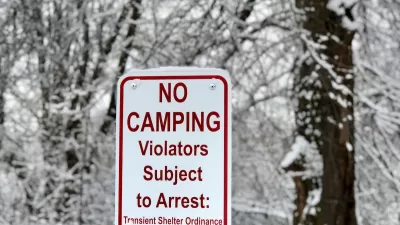Houston's homeless response program has yielded strong results in the last few years. Just 1,900 new affordable housing units could 'effectively end' homelessness in the city.

In an article published by the Kinder Institute for Urban Research, Mike Nichols, president and CEO of the Coalition for the Homeless of Houston/Harris County, outlines the success the city has had in reducing homelessness and the steps necessary to "effectively end" it. According to Nichols, the three-county homeless response system known as "The Way Home" has placed more than 24,000 people into housing since 2012. Of people housed in the last two years, more than 90 percent have maintained stable housing.
Nichols attributes the success of the program to several factors, including:
collaborative leadership and buy-in among local elected officials and local direct service provider agencies; a strong reliance on good data to drive decision-making; and an emphasis on prioritizing the most vulnerable for access to those programs first. We follow Housing First, a nationally recognized best practice that involves providing housing to people with no preconditions (e.g., sobriety) and then offering voluntary supportive services to help them maintain their housing.
Nichols points to strong investment in permanent, supportive housing as a key driver of Houston's success, but asserts that "we urgently need more one-bedroom, all-bills-paid apartment units to continue to house our clients." The Coalition estimates that the city needs 1,900 new affordable housing units to provide housing for all who need it.
Nichols concludes by highlighting the need for "available, safe, and affordable market-rate apartments" as a crucial tool for agencies working to help people who are unhoused.
FULL STORY: How close is Houston to ending homelessness? Closer than you think.

Maui's Vacation Rental Debate Turns Ugly
Verbal attacks, misinformation campaigns and fistfights plague a high-stakes debate to convert thousands of vacation rentals into long-term housing.

Planetizen Federal Action Tracker
A weekly monitor of how Trump’s orders and actions are impacting planners and planning in America.

In Urban Planning, AI Prompting Could be the New Design Thinking
Creativity has long been key to great urban design. What if we see AI as our new creative partner?

King County Supportive Housing Program Offers Hope for Unhoused Residents
The county is taking a ‘Housing First’ approach that prioritizes getting people into housing, then offering wraparound supportive services.

Researchers Use AI to Get Clearer Picture of US Housing
Analysts are using artificial intelligence to supercharge their research by allowing them to comb through data faster. Though these AI tools can be error prone, they save time and housing researchers are optimistic about the future.

Making Shared Micromobility More Inclusive
Cities and shared mobility system operators can do more to include people with disabilities in planning and operations, per a new report.
Urban Design for Planners 1: Software Tools
This six-course series explores essential urban design concepts using open source software and equips planners with the tools they need to participate fully in the urban design process.
Planning for Universal Design
Learn the tools for implementing Universal Design in planning regulations.
planning NEXT
Appalachian Highlands Housing Partners
Mpact (founded as Rail~Volution)
City of Camden Redevelopment Agency
City of Astoria
City of Portland
City of Laramie





























